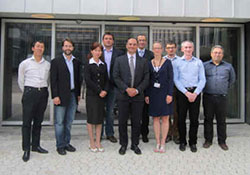Workshop to analyse results of a nationwide anti-tuberculosis drug resistance survey conducted in Uzbekistan

WHO
On 4–6 June 2012, a workshop was held in Copenhagen, Denmark, to analyse and discuss the results of the first nationwide anti-tuberculosis drug resistance survey conducted in Uzbekistan in 2010–2011. Representatives of the National Reference Laboratory in Tashkent, the Republican DOTS Centre in Tashkent, the Supranational Reference Laboratory in Gauting, Germany, Médecins Sans Frontières, WHO headquarters and WHO/Europe participated in the workshop. Together they finalized the survey data set, performed statistical analysis, determined the risk factors for multidrug-resistant tuberculosis and prepared a first draft of a report on the results.
Background
In the past decade, two previous studies were undertaken to measure the occurrence of MDR-TB among TB patients in Uzbekistan. The first survey was conducted in the Autonomous Region of Karakalpakstan in 2001–2002 and the second in the capital city, Tashkent, in 2005. Both surveys had only partial national coverage and the findings of these previous studies were therefore not applicable to the whole country. To obtain insight into the current level of anti-TB drug resistance in Uzbekistan and to determine the future diagnostic and treatment needs, the Ministry of Health conducted a first-ever nationwide survey in 2010–2011.
Based on the MDR-TB frequency observed in the previous studies, the recent survey aimed to collect data and specimens from a sample of 1200 sputum-smear positive pulmonary TB cases recruited through 100% sampling of patients from the capital and all regions in the country during 2010. Sputum samples were tested for resistance to isoniazid and rifampicin, using both conventional drug susceptibility testing and a line-probe assay at the National TB Reference Laboratory (NRL) in Tashkent. Confirmed MDR-TB cases were tested for resistance to fluoroquinolones and second-line injectables to detect extensively drug-resistant (XDR) TB. The NRL was supported by the Supranational TB Reference Laboratory (SRL) in Gauting, Germany. Data collection and laboratory testing were completed and an individual case database was prepared, including data on demographic and social features, clinical details, and drug susceptibility results of the respective M. tuberculosis isolates. The recent survey showed an increase in the rate of MDR-TB in comparison to the previous studies.



